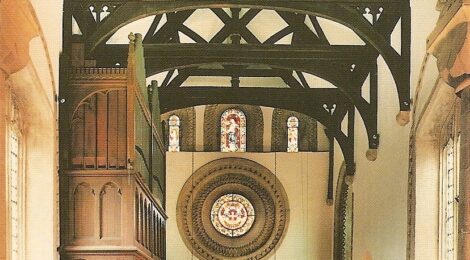
SERMON: Glimpses of heaven
A Sermon Preached on All Saints’ Sunday by Graham Low.
For virtually all of the first fifty years of my life I went to two churches dedicated to All Saints. As a young child I wondered about all these saints. Year by year I sang the famous hymn about saints, now resting from their labours, with God as their rock, their fortress, their captain in the well-fought fight. And while those of us on earth, struggle feebly, they in glory shine. The saints are seen as faithful soldiers, fighting to win the victor’s crown of gold, and they eventually pass in an endless stream through gates of pearl singing to Father, Son and Holy Ghost, to be with the rest of the saints in heaven. It was both an amazing vision, and also notably military in tone.
As we grow in our faith we become more aware of the extraordinary lives of people that the church has, down the ages, decided shall be called saints: the apostles, Mary, and Paul, and then the early church fathers, followed by many afterwards. Such people are often described as having apparently almost unattainable holy and moral virtues and sacred characters, and now live in heaven.
At the same time we begin to hear of ordinary people, perhaps friends or family, being called saints, while others are described as no saint. I’m sure we can all think of examples! And some people wonder which of them may go to heaven, and why.
In today’s reading from Isaiah we are given a prophesy of a day when God will bless everyone, wipe away all their tears, and take away their disgrace. The blessing is universal. The context for the author is the exile in Babylon, where horrific violence has occurred, and homes destroyed. The prophet says that the poorest wines shall be replaced by the very best. In such a situation these promises from the prophet Isaiah must have seemed very hard indeed to accept. But now, as Christians, we can set this prophecy within the context of the resurrection, when we believe that God destroyed the power of death, enabling people to live with hope beyond all reasonable hope.
Isaiah makes the joyful prophetic acclamation: This is our God: we have waited for him so that he might save us. Let us be glad and rejoice in his salvation. So Isaiah reminds us that we and all the saints may have to wait, but we all wait together in hope. Isaiah certainly offers no promise that saintly people will be immune to troubles: indeed here and in many parts of the Old Testament we find that saintly people are those who are put to the severest test, tears are shed, but there is confidence that they still remain within God’s care and love.
Though there have always been tears, and they remain shed today, our gospel reading reminds us that God has come to share tears as part of our human experience. Indeed, tears are a prominent feature of this reading. The encounter between Jesus and Mary after the death of Lazarus may seem an odd choice for All Saints’ day, but it reminds us of the depth of human grief at the time of a death. Even Jesus shed tears that have to be wiped. Through his tears Jesus brings Mary and Martha into the experience of God bringing life out of death.
Part of our vocation as Christians is to make known among those we know and meet that God has made his home among us mortals now. Saints are people who trust and live this vocation. They are people who risk going to places and situations where there are tears. They proclaim by their presence that God is also present and is bringing new life and transformation. Thus Mother Teresa went to India, gambling everything to respond to the call to go to the slums, risking death from disease, knowing that she might make no difference. I happen to know one of the people she rescued and whose life has been transformed. Her story, like those of many other women in Calcutta points to her deep belief in the presence of God in Teresa’s life, as well as in her own. And we can see the same presence of God at work in the cheerful no. 3 bus driver, in the housebound person who prays for those who pass her window, and in the touch of a nurse’s hand.
In our present lives we are sustained by the vision of Isaiah, and by the saints of yesterday and today. They lead us to believe that we are all held in God’s hands, and that we serve our Lord with those who weep, just as he did with his friend in her grief.
Saints see glimpses of heaven here on earth. Furthermore, Saints can have a vision of worship and of being in heaven. Saints are transparent. People see God through them.
At this time of commemorating all saints and remembering those who have died, let us bring to mind all those people we have known who have given us a glimpse of God’s glory and God’s way, and give thanks. And let us rejoice as we sing that we share with the saints and all the company of heaven in the great words of the Sanctus: Holy, Holy Holy. Amen.





